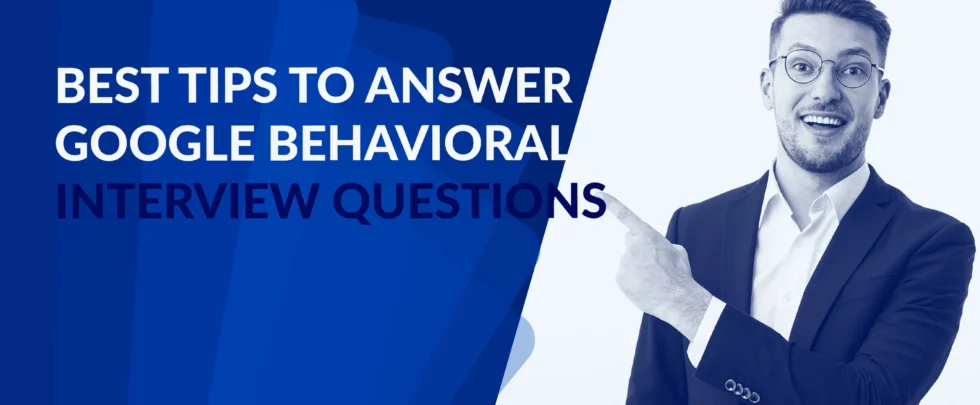If you’re pursuing a role at Google or Google Cloud, there’s a good chance you’ll still encounter “Google behavioral interviews” (even if it is a technical role), one of the main types of interviews that you’ll need to ace.
Although the open-ended nature of the questions in the Google behavioral interview may seem less challenging than their technical counterparts, they’re critical for interviewers to determine whether you’re a good fit for Google. As a result, it’s important to prepare for these questions and use them to set yourself apart from other candidates.
To help you succeed, we’ve put together this interview prep guide with everything you need to know to prepare for Google’s behavioral interview. This includes sample questions, tips on how to respond, and a practice plan to ensure that you land your dream job at Google.
Get ready to stand out from the crowd and show Google why you’re the perfect candidate for the job!
Why Are Behavioral Questions So Important?
Behavioral questions are a crucial part of the interview process at Google, and for good reason too. They are designed to give hiring managers insight into how a candidate has acted in past situations, as this can be a good indicator of how they may act in the future.
Google values candidates who demonstrate strong communication skills, leadership potential, and a focus on collaboration, so behavioral questions are the perfect way to help to identify these qualities in candidates!
The purpose of behavioral questions is to get to know the candidate on a deeper level, beyond their technical expertise. Google is not only looking for candidates who have the right skills for the job, but also those who will fit well into the company culture and work well with others. These questions help to uncover a candidate’s values, personality, and problem-solving abilities, which can be just as important as their technical abilities.
Answering Google behavioral questions effectively can help you stand out from other candidates and demonstrate your suitability for the role. By using specific examples from your past experiences, you can showcase your abilities and provide evidence of your past successes.
This can help interviewers to visualize how you might perform in a similar situation at Google and give them confidence in your abilities. While they may seem like simple questions at first glance, taking the time to prepare for behavioral questions can be the key to landing your dream job at Google!
What is Google looking for in a candidate?
What is Google looking for though? Don’t worry, we won’t hammer you with a long list for you to obsess over!
When it comes to interviewing candidates, Google looks for a variety of qualities and skills that align with their company culture and mission. One of the most important qualities that Google seeks is passion!
Yep, passionate people are not only enthusiastic about their work, but they also bring positive energy to the team that can be contagious. Google also looks for people who are intellectually curious and have a growth mindset. These individuals are eager to learn and are not afraid to take on challenges, which makes them excellent problem solvers.
In addition to passion and curiosity, Google values collaboration and teamwork. They want candidates who can work well with others, communicate effectively, and contribute to a positive team culture. Another key trait that Google looks for is leadership.
Candidates who can demonstrate leadership potential, even if they are not applying for a managerial position, are highly desirable. This includes taking initiative, making decisions, and inspiring others to follow their lead.
Not just that, Google places a strong emphasis on creativity and innovation. They want candidates who can think outside the box and bring fresh ideas to the table. This involves having a unique perspective and being able to approach problems from different angles.
Last but not least, Google looks for candidates who possess strong technical skills, which are specific to the role they are applying for. Whether it’s programming languages or data analysis tools, having the necessary technical skills is crucial for success at Google!
A List of 30+ Google Behavioral Questions
In this article, we have gathered for you a thorough list of behavioral questions that Google asks, and you do not have to run around reading through different articles to find different questions:
- Tell me about a time when you faced a challenge and how you overcame it.
- Describe a situation where you had to make a tough decision.
- How do you handle conflicts with team members?
- Tell me about a time when you had to work on a project with a tight deadline.
- Describe a time when you had to persuade someone to see things your way.
- How do you handle failure or setbacks?
- Tell me about a time when you had to work with someone difficult.
- Describe a situation where you had to adapt to a new environment or situation.
- How do you prioritize and manage your workload?
- Tell me about a time when you had to learn a new skill or technology.
- Describe a time when you had to take the initiative and lead a project.
- How do you handle stress and pressure?
- Tell me about a time when you had to think creatively to solve a problem.
- Describe a situation where you had to deliver bad news to a team or client.
- How do you handle ambiguity or uncertainty in a project?
- Tell me about a time when you had to collaborate with a team to achieve a goal.
- Describe a time when you had to communicate complex ideas to a non-technical audience.
- How do you handle ethical dilemmas in the workplace?
- Tell me about a time when you had to work with someone from a different culture or background.
- Describe a situation where you had to deal with a difficult customer or client.
- How do you stay motivated and focused on long-term goals?
- Tell me about a time when you had to work on multiple projects simultaneously.
- Describe a time when you had to implement a change or process improvement.
- How do you handle tight feedback and criticism?
- Tell me about a time when you had to mentor or coach someone.
- Describe a situation where you had to manage conflicting priorities.
- How do you stay organized and manage your time effectively?
- Tell me about a time when you had to negotiate a deal or contract.
- Describe a time when you had to make a difficult trade-off.
- How do you handle working with remote or virtual teams?
- Tell me about a time when you had to handle a crisis or emergency.
- Describe a situation where you had to balance competing demands.
- How do you handle constructive feedback?
- Tell me about a time when you had to resolve a conflict within a team.
- Describe a time when you had to take a calculated risk.
- How do you handle working with stakeholders who have different priorities?
- Tell me about a time when you had to negotiate a compromise.
- Describe a situation where you had to influence someone who had more authority than you.
- How do you handle working with people who have different work styles?
- Tell me about a time when you had to challenge the status quo.
How to Answer Google Behavioral Interview Questions
Now that you’ve seen some of Google’s top questions, let’s see how can answer them shall we!
The STAR method is a popular technique used to answer behavioral interview questions that Google and many other companies use. STAR stands for Situation, Task, Action, and Result. By following this method, you can provide a well-structured answer that highlights your skills and experience.
To start, you will need to identify the situation or problem you were faced with in the past. Next, describe the task or goal you were trying to accomplish. Then, explain the actions you took to address the situation and achieve the task or goal. The last thing you have to do here is describe the results of your actions and what you learned from the experience.
Let’s say the question is “Tell me about a time when you had to work with a difficult team member.” Here’s an example answer using the STAR method:
“In my previous job, I worked on a project with a team member who was consistently uncooperative and missed deadlines, which impacted the entire team’s progress.
My task was to ensure the project was completed on time and to the best of our abilities. To address this, I scheduled a one-on-one meeting with the team members to understand their perspectives and to find out how we could work better together. I listened to their concerns and explained how their behavior was impacting the team’s success.
We came up with a plan to improve communication and to set clear expectations. As a result, the team member became more reliable, and we were able to complete the project on time, which impressed our manager and improved team morale.”
Or, if you want an example a little more broken down then how about this one:
Imagine Google asking: “Tell me about a time when you had to deal with a difficult customer.” By using the STAR method mentioned above, you might answer like this:
Situation: “At my previous job as a customer service representative, I received a call from a customer who was very upset about a product they had purchased.”
Task: “My task was to resolve the issue to the customer’s satisfaction, while also following company policies and procedures.”
Action: “I actively listened to the customer’s concerns and empathized with their frustration. I then offered several solutions to resolve the issue, including a refund or exchange of the product.”
Result: “Ultimately, the customer was satisfied with the resolution and thanked me for my help. The experience taught me the importance of active listening and problem-solving in customer service.”
Tips to Impress Your Interviewer
We are slowly getting through this article but before, let us equip you with some tips that you need to tie everything together during your interview!
#1: Do Not Focus on Unnecessary Details
Here it’s important to stay focused on the essential details. Remember, the interviewer hears a lot of stories from candidates, and they may lose interest if you go into unnecessary details.
This is why it’s a good idea to share your stories with a few different people before your interview and ask them what details they would suggest cutting.
This way, you can get an outsider’s perspective and ensure that you’re only sharing the most important information.
We will highlight the STAR method once again because it is a great tip to help you stay focused! This method encourages you to focus on the Situation, Task, Action, and Result of a particular scenario as we mentioned previously, which can help you stay on track and avoid going off on tangents.
Using the STAR method can help you provide a structured and clear response, which is essential when you’re trying to stand out among other candidates!
#2: Don’t Be Afraid to Talk About Yourself
You might think that you should not come off as too self-absorbed during an interview if you talk about yourself a lot. And while you are right about coming across that way if you overdo it, you have to recognize that the interview you are taking is technically about you.
You have to own being the center of attention when you are taking interviews and take it as a sign to shine and show all the skills that you possess!
Simply create some dimension in the things you discuss and expand the horizons of your examples!
#3: Have Your Follow Up Questions Ready
We know we just said that your interview is about you, but that does not mean you don’t get to put your interviewer under the spot either (in a good way of course)!
Interviewers rarely expect to be the ones who get asked questions, so when you do, you are more likely than not to take yourself out of the usual routine that they experience.
You stand out even more if your questions spark some sort of back-and-forth conversation!
How to prepare for a Google behavioral interview
Let’s recap, shall we?
#1: Research Google’s Core Values
Before you go into your interview, it’s important to know the core values that Google upholds. Google’s hiring process is geared towards identifying individuals that demonstrate a strong alignment with these values.
The values are creativity, curiosity, passion, honesty, and fun. Take some time to research these values and consider how you can highlight them in your responses to Google behavioral interview questions.
#2: Practice the STAR Method
The STAR method is a popular framework that helps you structure your responses to behavioral interview questions. It stands for Situation, Task, Action, and Result.
This method ensures that your answers are structured and well-thought-out, and it allows you to provide relevant information that the interviewer is looking for. It’s a great way to make sure you’re providing the right amount of detail without rambling.
#3: Identify Your Strengths
To prepare for a Google behavioral interview, it’s important to understand your strengths and how they align with the job requirements. Identify your strengths and reflect on how they relate to the core values of Google. You can then use these strengths to craft answers that showcase how you are an ideal fit for the role.
#4: Practice, Practice, Practice
Practice makes perfect, and this is especially true for interviews. Once you’ve researched Google’s core values, identified your strengths, and practiced the STAR method, it’s time to start practicing your answers.
Look up common Google behavioral interview questions that Google may ask and practice answering them out loud. You can also record yourself and play it back to see where you need to improve.
#5: Be Specific and Concise
When answering Google behavioral interview questions, be specific and concise. Provide details about your experience and accomplishments, but don’t go into too much unnecessary detail. The interviewer is looking for specific examples of how you have demonstrated the core values of Google, so make sure your answers are tailored to highlight those aspects of your experience.
Bottom Line
We hope these tips will help you prepare for your upcoming Google behavioral interview with confidence and ease. Remember, the key is to practice, stay calm, and be authentic in your answers. By using the STAR method, focusing on essential details, being proud of your accomplishments, adapting to follow-up questions, and sharing how you learned from failure, you’ll be well on your way to acing your interview!
Remember that Google is looking for candidates who not only have the technical skills but also have the right behaviors and qualities that align with their culture and values. So, make sure to showcase your best self and demonstrate your ability to work well in a team, adapt to challenges, and think creatively!
Good luck with your interview, and don’t forget to celebrate your accomplishments along the way


